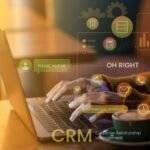Salesforce is rated the best CRM in the world, but to realize its full potential, businesses must properly manage it. While each organization is unique, many universal best practices can help businesses in all industries. Salesforce should be a part of any SaaS platform. It’s the only way to make sure your users have access to the mission-critical data they need when they need it. SaaS companies need Salesforce CRM as the foundation for managing complex sales cycles, decreasing churn, and allowing the Sales team to complete deals faster.
The fact that so much work is done online is a distinguishing feature of SaaS businesses. Salesforce is cloud-based, which makes it simple to integrate with current company systems using APIs and integration mechanisms.







